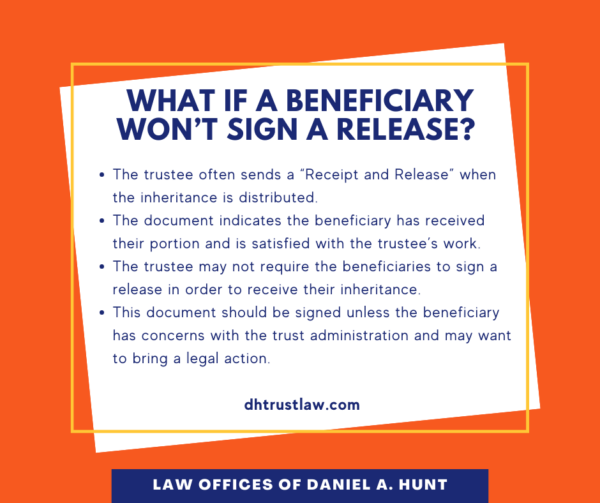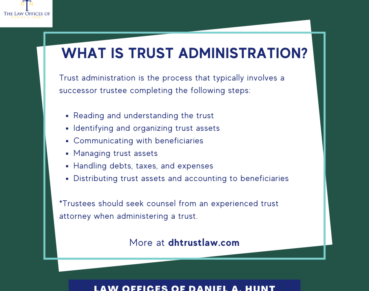What Happens If a Beneficiary Refuses to Sign a Release?

At the end of a trust administration, the trustee typically sends an account and report of the trustee’s activities which includes a waiver of claims to each beneficiary. Signing this waiver indicates that the beneficiary is satisfied with the trustee’s work and accounting and will not bring a legal dispute against the trustee in the future. But not all beneficiaries opt to sign this document. The trustee may wonder: What happens if a beneficiary refuses to sign a release?
What is a Receipt and Release?
The document called Receipt and Release often accompanies the beneficiary’s inheritance and an accounting of the trust administration. The release indicates that the beneficiary has received the check, and is satisfied with the trustee’s work during the trust administration.
The beneficiary sends a release for two main reasons. First, the release shields them from future personal liability for their actions as trustee. This grants them peace of mind so they can rest assured that later down the line, the beneficiary won’t decide to take legal action against them.
Second, a release guarantees that once the trustee has distributed the trust assets, they won’t need to take back assets and distribute them differently.
Is It Mandatory to Sign a Release?
While a trustee can send the beneficiaries a Receipt and Release, they cannot make their inheritance contingent upon signing the document. In other words, the beneficiary is not required to sign a release in exchange for their inheritance check. If a beneficiary has concerns with the trust accounting or actions the trustee took during the trust administration, the beneficiary should consult with a trust and estate litigation attorney.
If there are no concerns, it is recommended that the beneficiary sign the document. If the beneficiary does not sign and return the release, then the statutory period for bringing a claim after receiving the accounting and report is three years, unless the trust has language that limits the period to a minimum of six months.
Can the Beneficiary Change Their Mind?
After signing a release, the beneficiary cannot later change their mind and decide to contest the trust administration. If they attempt to do so, the court will likely dismiss their case.
If you have any questions about what happens if a beneficiary refuses to sign a release, feel free to contact our office.
Law Offices of Daniel A. Hunt
The Law Offices of Daniel A. Hunt is a California law firm specializing in Estate Planning; Trust Administration & Litigation; Probate; and Conservatorships. We've helped over 10,000 clients find peace of mind. We serve clients throughout the greater Sacramento region and the state of California.




